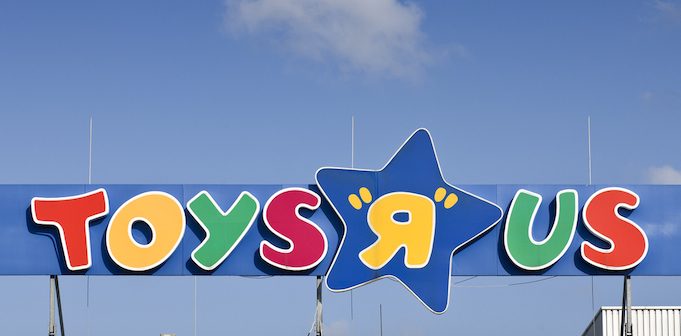
The bankruptcy of US retail giant Toys ‘R’ Us will have flow-on impacts to one of Australia’s biggest toy brands, with one insolvency expert calling on small businesses to do everything they can to protect themselves against the collapse of distributors.
The US arm of Toys ‘R’ Us filed for chapter 11 bankruptcy protection on Monday, with debts amounting to $US5 billion ($6.3 billion) , reports Forbes.
In a statement, the company explained the application only applies to the United States and Canadian operations of the business, while a spokesperson for the company confirmed to Fairfax that the Australian stores are not affected by the proceedings.
“The Company’s operations outside of the U.S. and Canada, including its approximately 255 licensed stores and joint venture partnership in Asia, which are separate entities, are not part of the Chapter 11 filing and CCAA proceedings,” Toys ‘R’ Us said in a statement.
The company says its US bricks-and-mortar and online stores will continue to trade and will ramp up towards Christmas. The bankruptcy filing will allow the US company to see “the financial constraints that have held us back will be addressed in a lasting and effective way,” according to chief executive Dave Brandon.
Analysts across the US believe the filing is a warning of more pain to come in the 2017 Christmas retail trade. Closer to home, Australian businesses are also affected: The Australian reports $600 million toy business Moose is a major unsecured creditor to the US business, owed $US9.5 million ($12 million).
Moose Toys is headed up by former EY Entrepreneur of the Year, Rich Lister Manny Stul. The brand has global popularity through products including its small doll range, Shopkins.
A Moose Toys spokeswoman told SmartCompany this morning the business remains confident in Toys ‘R’ Us and Moose will “continue to support them”.
“Toys ‘R’ Us are a vital part of the toy industry and Moose looks forward to maintaining our relationship with the team and continuing to supply them with toys that make children happy,” the spokeswoman said.
There are 40 Toys ‘R’ Us stores in Australia. SmartCompany contacted Toys ‘R’ Us Australia and law firm Gilbert + Tobin, which is reportedly working with the local stores as its parent company negotiates the bankruptcy processs, for comment, but did not receive a response prior to publication.
Suppliers unprepared for collapses
Jamieson Louttit, insolvency expert at Jamieson Louttit and Associates, says news of the collapse of Toys ‘R’ Us speaks volumes about the state of bricks-and-mortar retail globally.
“This is what’s happening in the retail environment at the moment, and we haven’t even reached Christmas,” he says.
When suppliers are owed money as unsecured creditors in cases like this one, they face a challenge in recovering their entitlements because they are “well down the list” behind secured creditors that are owed money, Louttit says.
He observes that while there is not much a business can do but wait when faced with this kind of situation, in general Australian businesses do not prepare themselves for the possibility they might lose out when a big distributor falls over.
He says that for every insolvency, there are around four other entities that are placed under pressure. Sometimes this can create a “self-perpetuating” wave of collapses.
While businesses can’t entirely protect themselves from the effects of another company’s collapse, particularly if the business is an overseas entity, Australian companies can take steps to ensure some protections for the goods they supply, Louttit says.
He observes that many small companies forget about the government’s Personal Property Securities Register (PPSR) scheme, which allows businesses to register goods so they can retain an interest in stock that is in transit.
“It’s a cheap cost, it’s about $9.90 to register, yet there’s a lack of education in Australia about maintaining your rights to recovery,” Louttit says.
Registering goods through the PPSR scheme puts a business in the best position to reclaim those goods if they have been supplied to another party in Australia but no payment has been received, or if they are being shipped and the receiving party has gone broke.
In broader terms, Louttit believes Australian retailers should prepare for tough times ahead as Amazon hits the scene.
“If Australian retail is going to be pressured, it will be pressured on margins,” he says.
Never miss a story: sign up to SmartCompany’s free daily newsletter and find our best stories on Twitter, Facebook, LinkedIn and Instagram.


COMMENTS
SmartCompany is committed to hosting lively discussions. Help us keep the conversation useful, interesting and welcoming. We aim to publish comments quickly in the interest of promoting robust conversation, but we’re a small team and we deploy filters to protect against legal risk. Occasionally your comment may be held up while it is being reviewed, but we’re working as fast as we can to keep the conversation rolling.
The SmartCompany comment section is members-only content. Please subscribe to leave a comment.
The SmartCompany comment section is members-only content. Please login to leave a comment.